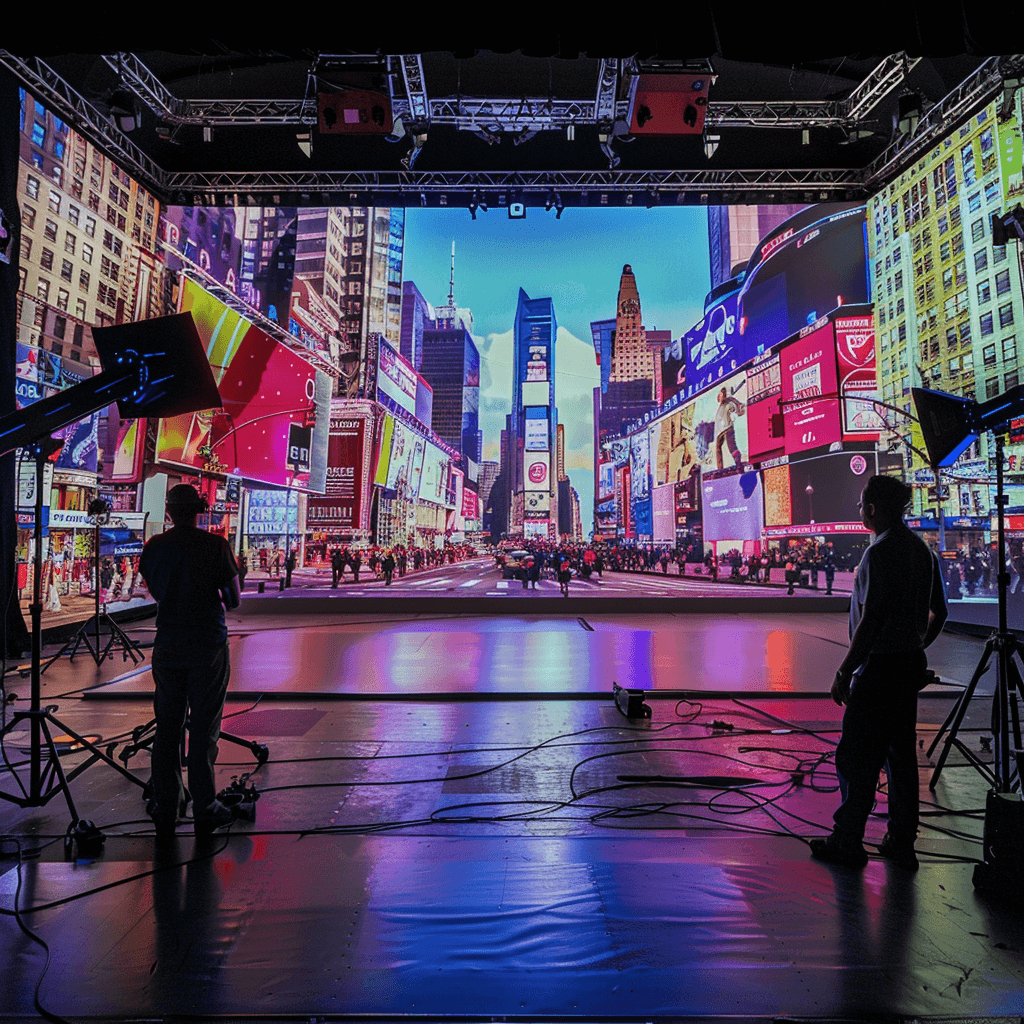Looking to work in Virtual Production? – here are the key jobs in this exciting industry…
If there’s one industry where you’re sure to find some fantastic job opportunities right now, it’s in XR and its associated industries. With aspects like the Metaverse on the not-so-distant horizon, it’s a hugely exciting time for the industry.
For those with a real creative edge and deep knowledge of XR related technology, a role in Virtual Production provides the perfect blend of creativity and technology.
While it’s not entirely new, the combination of industry, real-time engine technology (such as Unreal engine), and macroscopic developments is accelerating Hollywood’s interest in Virtual Production
The VFX costs on a large film production can be as high as 20% of the total film budget. Using Virtual Production on film shoots significantly reduces postproduction VFX costs like compositing and rotoscoping and helps filmmakers get ready for test screening more quickly.
So, where exactly can you get started with a career in the exciting world of Virtual Production and what roles are available? – let’s take a look at some of the key roles that make up this fantastic industry…
Virtual Production Supervisor
The Virtual Production Supervisor is the overall manager of a real-time visual effects environment. The role is also responsible for bridging the gaps between various other members of staff in Virtual Production. These include such as the physical production team, the art department, and the real-time crew.
A Supervisor in any position will always operate more effectively in their role if they know how to make the most of the right leadership techniques. You’ll need to have a lot of confidence working as part of a team and directing other people to excel in this role. Additionally, it helps to have extensive experience with major productions, so you can handle the stress.
The most effective Virtual Production Supervisors are often sourced from VFX backgrounds or an existing role as a traditional Producer. You’ll need not only technical mastery to excel in this position but a wide range of people skills. Understanding the technology you’re working with well enough to explain it to others in a simple, easy-to-understand language is crucial too.
Systems Technical Director
A Technical Director is exactly what it sounds like – someone responsible for handling the operation of various technical components in Virtual Production. Systems Technical Directors in the new age of production will handle all of the real-time specific hardware on a volume, including real-time, render nodes, LED walls, lighting and more.
This role has a lot of overlap with Volume Operators and System Administrators. As a result, you’ll need to have a lot of confidence working as part of a team! You’ll also need to learn how to select, integrate, and operate various components in a Virtual Production ecosystem. For instance, a real-time engine is a relatively new solution for working with LED, tracking, and camera systems. The new integration means individual employees, like Systems Technical Directors, need to invest a lot of time into care, maintenance, and customization.
Systems Technical Director is one of the most complex roles to fill in the Virtual Production landscape. Largely because it requires familiarity with a range of different systems. Sometimes, vendors themselves can provide the best experts for teaching users how to operate their systems.
The Volume Operator
The Volume Operator in a Virtual Production environment is a crew member from the volume operations landscape, responsible for the management and use of content connected to the LED volume. There are often numerous different kinds of Volume Operators available on set to ensure a successful Virtual Production, including Volume Operator assistants.
As a Volume Operator, you’ll be dealing with a range of different kinds of content, from 2D feedback to 3D real-time gaming environments (e.g. Unreal Engine). With this in mind, expertise in live video environments and real-time rendering software will usually be extremely useful. At the same time, it’s helpful to have a strong eye for detail and a “big picture” vision, so you can predict how things should look in a real-world environment from a cinematography perspective.
The majority of Volume Operators in the modern production landscape are likely to come from the gaming world, where animators and developers will already have experience with real-time engines and their accompanying software.
LED Engineer
LED panels are a common part of the Virtual Production landscape, and also a crucial technical element in need of regular care and maintenance. An LED Engineer is the specialist responsible for both managing and maintaining LED panels within a volume.
Usually, the panels in an LED volume are modular squares, and each production may require hundreds of thousands of these individual panels to be maintained and managed to keep processes running smoothly. Strong expertise is going to be a must-have for this role, as well as in-depth knowledge of various video and projection techniques. You’ll also need a basic knowledge of IT, video signal flow technology, and cable management.
LED panel technology isn’t quite as new as some of the components involved in the Virtual Production landscape. These tools have been around for several years in live broadcasts, theatrical projection and concerts. So, there may already be people out there with the specialist knowledge required to be an LED Engineer.
Engine Operator
The Engine Operator is an individual responsible for maintaining and using real-time engines (Unreal/Unity) within the volume. The Engine Operator deals with loading and operating assets, and has a crucial role, because the engine is what generates the live environment in the production.
The position of the Engine Operator may sometimes be split across a number of operators, who are each responsible for different areas, like virtual camera position, playback of virtual interactive elements, and lighting settings. You’ll need a deep knowledge of real-time animation software such as Unreal Engine to succeed in this space and a lot of experience with real-time elements.
VFX Supervisor
Like a Virtual Production Supervisor, a Visual Effects Supervisor is another professional who should have a relatively strong knowledge of team management. As a supervisor, you’re going to need the right communication skills to guide your employees, motivate your staff, and make the right connections between different people in the Virtual Production.
Visual Effects Supervisors are responsible for both the technical and creative elements of visual effects in the production. This role is more established than some of the other positions mentioned, as visual effects have been in the cinema landscape for many years. However, the introduction of real-time assets and complex engines does mean that the visual effects supervisor role is evolving.
More companies are now using real-time tools to supplement parts of their rendering pipeline. A deep understanding of the rendering process and the potential of the real-time Unreal engine can be important in this position. You’ll find you migrate naturally into this role if you already have experience as an Animator, Compositor, Coordinator, or someone else involved in the pipeline for visual effects.
Virtual Camera Operator
Another role that is exactly what you might expect is that a Virtual Camera Operator is a person responsible for operating a virtual camera, often through an input device such as a tracked physical item (through sensors), a mouse, or a tablet.
For instance, to create films like The newly released ‘The Batman’, a film crew likely used various Steadicam rigs, drones, and cranes to capture shots within the virtual world. A virtual camera operator won’t constantly interact with the real-time engine directly. Still, their movements will allow them to navigate a virtual camera and create unique images based on those movements.
To thrive in this position, you’ll need a deep understanding of traditional cinematography because virtual camera movements are better when they have believable, real-world depth. Traditional camera operators and photography directors could be ideal in the Virtual Camera Operation position. Game Developers also have a lot of potential in this space because they understand how the engine works and use it to their advantage.
Real-time Compositor
An individual responsible for compositing various elements of 3D and 2D content during production in a volume, a Real-time Compositor is often an essential member of the Virtual Production crew. It’s easy to look at the contents of an LED wall, for instance, as a single piece of 3D content, but images usually contain a variety of layers that are individually adjustable.
Real-time Compositors use software packages like DaVinci Resolve, or game engines like UnReal Engine to compose the virtual experience. You’ll likely do well in this position if you’ve previously had a role in visual effects or post-production, where the focus is on creating quality, realistic images, rather than rushing to meet a deadline. However, with real-time composition, you may find you’re under more pressure to complete tasks at speed, due to the live pace.
Motion Capture Supervisor
Responsible for working with various aspects of motion capture data, a Motion Capture Supervisor isn’t an entirely new role, but it is a job taking on new angles in the age of real-time engines and data management. Motion capture in a Virtual Production comes in a range of different shapes and sizes.
Motion capture can help actors to puppeteer various virtual characters, or to transfer the movement of live-action individuals into virtual cameras, creating a more hybrid approach to realistic animation and film-making. To survive in this role, it’s helpful to have a strong knowledge of motion capture concepts and technology. You’ll need to know how to use suits, rigs, and software.
It’s also helpful to understand real-world physics and the movement of cameras in a traditional cinema setting. Motion capture has been around for long enough now that there are already a large number of people educated in this space.
Data Manager
Data is something anyone in the production landscape is going to need to be familiar with in the years ahead. The Data Managers are experts responsible for handling all kinds of on-set data, from camera telemetry and footage to real-time scene metadata. The background of a typical Data Manager typically started life as a Software Developer or Analyst and migrated into the role.
However, film crew and professionals coming from a film-centric background will usually be comfortable experimenting with the data landscape too. This is going to be a critical role for anyone involved with Virtual Production because losing data can lead to expensive reshoots and issues with consistency. Unfortunately, there’s a huge talent gap in this area at present.
System Administrator
Far from the most unusual sounding role on this list, a systems administrator is simply an IT professional responsible for overseeing areas like network infrastructure, media servers, spectrum management, and so on. Because so much software and hardware need to work perfectly for a virtual experience to function, this role can be quite complex. In the modern movie landscape, a set is already packed full of various different pieces of crucial equipment, from video monitoring and camera tools to sound gear and communication support.
Adding an LED volume and its various systems can further increase the complexity. However, if you’ve got a background in working with technology, and you’re confident enough in your field, you should be able to survive as a Systems Administrator. Administrators can often be found from all over the tech industry.
Video Engineer
Video Engineers are in charge of maintaining and routing video signals in production from various sources and destinations within a volume. The live content running on an LED volume comes from a powerful computer and a render node, moving through various pieces of video processing equipment, before eventually routing the signal to individual panels.
Depending on the volume you’re working within your production, the solution can become extremely complex, and video engineers need to be on-hand to make sure the signal flow is optimal. Video engineers will need to know all about existing video standards, and the best practices for routing and calibrating signals.
Professionals with experience in all kinds of live broadcasting environments for sports, news, live events, shows, and more, will be welcomed into the video engineer position. The parts of the role where you need to learn how to use real-time engines and LED walls should be simple enough with access to the right training.
Finding your New Role in Virtual Production
There are many varied and exciting avenues available for people looking to work in Virtual Production. With the major ongoing investments by film production companies, streaming platforms and software/hardware technology companies, the Virtual Production industry will continue to be an exciting industry to work in for many years to come.
If you’re looking to move into Virtual Production and want some advice or guidance, we’d love to hear from you!




